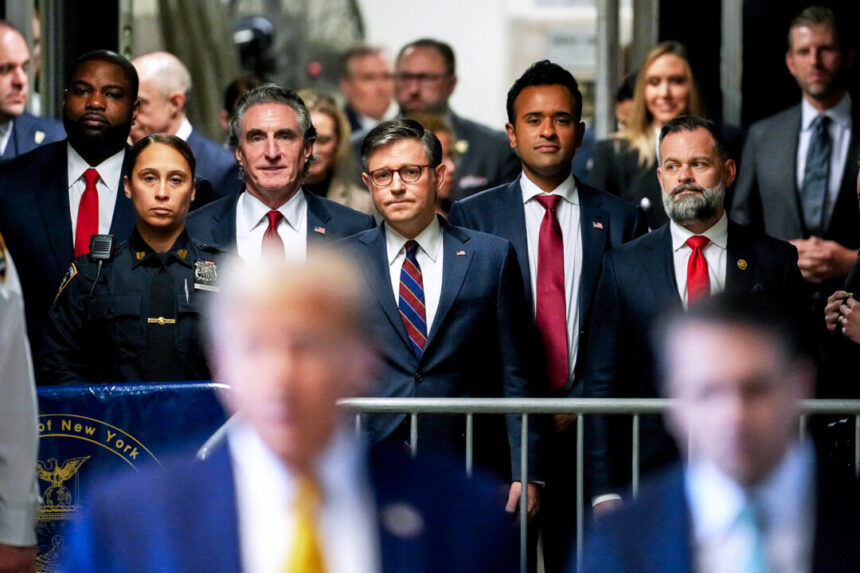Musk and Ramaswamy will attend the Dec. 5 meeting that the host, House Speaker Mike Johnson, says will focus on regulations. Some want earmarks on the table.
WASHINGTON–Elon Musk and Vivek Ramaswamy, leaders of the incoming Trump administration’s Department of Government Efficiency (DOGE) initiative, will meet with Republicans in Congress on Dec. 5 to discuss reducing the size of the federal government. Though few details of their plans have been released, members are divided on whether to scrap earmarks, a provision of the government funding process that has concerned fiscal conservatives for years.
Earmarks are provisions in Congress’s annual appropriations (government funding) bills that allocate taxpayer money to specific projects and locations, bypassing a merit-based competitive process normally required for government grants and contracts. Several fiscal conservatives in Congress, chiefly Sen. Rand Paul (R-Ky.), have long said that earmarking leads to wasteful spending and amounts to “pork” for local special interests.
Congress imposed a moratorium on earmarks in 2011, which was lifted in 2022 with bipartisan support.
While House Speaker Mike Johnson (R-La.), host of the meeting, has written that it will focus on “regulatory rescissions, administrative reductions, and cost savings,” several members of Congress told The Epoch Times that earmarks should be considered.
“[We will] collaborate on how the DOGE is going to operate in the upcoming administration, how we can create greater efficiencies within the federal government, and then, of course, cut waste and abuse where we can,” Sen. Joni Ernst (R-Iowa), chair of the Senate DOGE Caucus, told The Epoch Times.
When asked whether earmarks should be considered in the process of cutting waste and abuse, Ernst replied: “I would love to see earmarks go, yes.”
Several Republican members of Congress agreed with Ernst’s position.
“If everybody would give up earmarks, I’d be willing to not participate in the earmark program either,” said Rep. Ronny Jackson (R-Texas). “I’m not going to unilaterally make that decision and punish my district, but I would be willing to take cuts across the board.”
“I’m not for getting rid of earmarks. I’m not for reducing the authority of the Appropriations Committee. So, that’s not something I would support. But, again, that’s a relatively tiny piece of what we’re talking about, it’s not that much money,” House Appropriations Committee Chairman Tom Cole (R-Okla.) told The Epoch Times.
“If you really want to save $2 trillion, you can’t do that off the discretionary budget. … You want to, like, get serious about entitlement spending because that’s where the real money’s at,” he said, referring to proposals to reform Social Security, Medicare, and Medicaid spending—which took up 55 percent of the federal budget in fiscal year 2023—but whose popularity has deterred reform efforts in Congress.
“Earmarks should be evaluated based on their merit. … I absolutely was sent by my constituents to make sure that important projects are equally considered in my district as they are in others,” said Rep. Darrell Issa (R-Calif.).
Rep. Derrick Van Orden (R-Wis.) explained the importance of earmarks to him.
“When we send money to Wisconsin … they skip my district because we’re rural and we’re conservative,” he said. “So, I did earmarks … I speak to my people directly, they tell me what they need directly, and then we fund them directly.”
Others have entirely different ideas on how to cut costs in the government.
“If you look at any permitting process, there’s usually several agencies that are involved. We could get rid of a lot of it without damaging any protections,” said Rep. Celeste Maloy (R-Utah).
Musk and Ramaswamy have provided few specific plans for DOGE, which will not have the power to order changes to the government itself. Both men have suggested personnel changes, with Ramaswamy suggesting that 75 percent of the civilian federal bureaucracy could be dismissed.
Despite its designated title, DOGE is not a government agency, as that would require an act of Congress. It’s unclear whether the organization has been formally incorporated or what the terms of its relationship with the federal government will be. DOGE did not respond to a press inquiry submitted via X.










